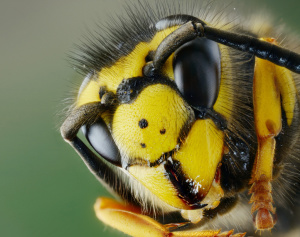 Britons are gearing up for a serious invasion by wasps. "Colder winters often mean there are more wasps around the following summer as mated queens spend the period deep in hibernation," AOL.com explains. Although the U.K. is expecting wasps in record numbers, it is not the only country that has to be on alert (not by a long shot!). In the U.S., a single nest can hold between 10,000 and 50,000 wasps; there are 2,500 wasp species that flourish in North America, and at least 50 sting. Thankfully, with some care, you can keep wasp infestations at bay. Here's how:
Britons are gearing up for a serious invasion by wasps. "Colder winters often mean there are more wasps around the following summer as mated queens spend the period deep in hibernation," AOL.com explains. Although the U.K. is expecting wasps in record numbers, it is not the only country that has to be on alert (not by a long shot!). In the U.S., a single nest can hold between 10,000 and 50,000 wasps; there are 2,500 wasp species that flourish in North America, and at least 50 sting. Thankfully, with some care, you can keep wasp infestations at bay. Here's how:
Take A Critical Look At Your Home
Wasps are attracted to certain kinds of homes and are particularly likely around wood and asphalt. The pests also flock to overhangs and ledges. While it's not always possible to do much about it, if you have plans to remodel in the future, these are some helpful things to keep in mind. It's also entirely feasible to limit use of cloth awnings and overhangs. Use them only while dining or entertaining in outdoor areas, and fold them up or put them away when you are through.
Leave Wasps' Nests Alone
Professional pest control services warn renters and homeowners to steer clear of wasps' nests. While it may be tempting to take matters into your own hands, playing the role of professional exterminators or an exterminator company can be dangerous. Wasps can be aggressive, and they are most likely to sting when provoked. As such, it is a very bad decision to agitate the thousands that may be present in the nest all at once. Call in pest control services to take care of it.
In the future, you can use several home remedies to ward off wasps and encourage them to build nests elsewhere. Wasps do not like the scents of peppermint or cinnamon. Mix a few drops of peppermint oil with some unscented baby shampoo (the shampoo helps the mixture stick) and spray around ledges and doors, or sprinkle the area with cinnamon shortly after professionals remove wasps' nests.
What are the most popular summer pests? Expect wasps and ants (with over 700 species). Ward off wasps by avoiding wood and asphalt when possible, and using natural remedies to keep them off ledges and overhangs.


